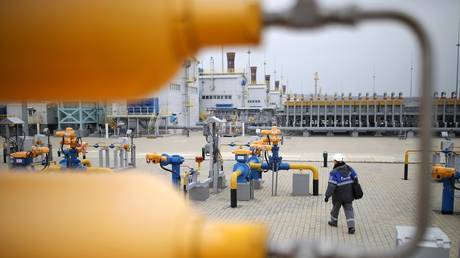EU sees a 40% increase in Russian pipeline gas supplies
According to Vedomosti, the supply of Russian gas to the EU through the TurkStream pipeline increased by 40% during the period from January to July compared to 2023.

According to Vedomosti, Russian gas supplies to the EU through the TurkStream pipeline rose by over 40% during the first seven months of 2023 compared to the same timeframe last year, based on gas transmission data. The publication attributes the high demand for Russian fuel to heat waves impacting Europe and Asia.
In July, Gazprom, the Russian state energy company, delivered more than 1.5 billion cubic meters (bcm) of gas to the EU via TurkStream, marking a 29% increase from the previous month. The year-on-year deliveries were also up by 9%, as reported by the newspaper, referencing data from the European gas transmission group Entsog.
TurkStream is a natural gas pipeline that extends from Russia to Türkiye across the Black Sea and continues to the border with Greece, an EU member. Another route for Russian pipeline gas to reach the bloc is through the transit system in Ukraine.
Gazprom used to be the primary gas supplier to the EU. However, following the onset of the conflict between Kyiv and Moscow, it significantly reduced its exports to the bloc in response to Western sanctions and the sabotage of the Nord Stream pipelines.
In an effort to decrease reliance on Russian pipeline gas, the EU has shifted focus towards increasing imports of LNG, particularly from the US.
Bloomberg reports that American suppliers reduced their shipments to the EU in July, opting instead to send their LNG tankers to Asia, where prices were higher. In fact, last month saw the US export more of its seaborne gas to Asian consumers than in any month since 2021, attributed to rising demand in the region due to extreme temperatures.
Sanctions related to Ukraine imposed by Brussels have not yet targeted pipeline gas supplies, but a number of EU countries, including Poland, Bulgaria, Finland, the Netherlands, and Denmark, have chosen to voluntarily stop their imports. Conversely, several EU nations, such as Austria, Hungary, Slovakia, and Italy, continue to import Russian pipeline gas.
The gas transit agreement between Gazprom and Ukraine is set to expire at the end of this year, with Kyiv indicating it has no intention of extending it. Reports last month suggested that various EU countries were exploring options to maintain the flow of gas through Ukraine’s transit network beyond 2024.
Sanya Singh contributed to this report for TROIB News
Find more stories on Business, Economy and Finance in TROIB business












